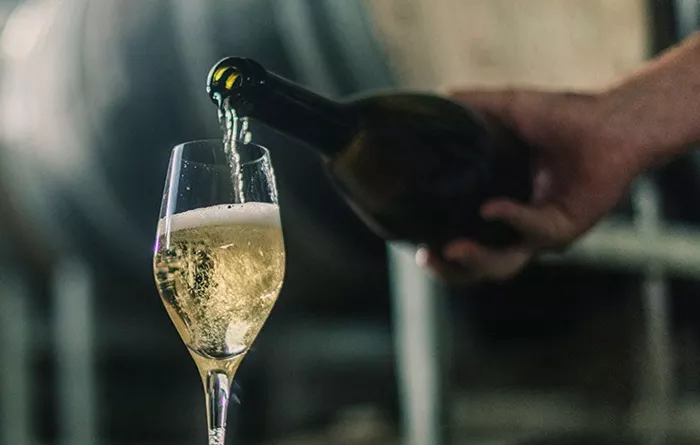Avignon, France – As grapevines across southern France’s renowned wine regions begin their seasonal growth, an economic storm is already brewing for many European vintners.
Château Terre Forte, a family-run winery near Avignon, is among those feeling the early strain. Co-owner Nadine Auray revealed that financial constraints have already led to workforce reductions. “We had to let one worker go because we couldn’t afford to pay him anymore,” she said. “That’s one person out of a job, and now we need to find new markets.”
Her husband and business partner, Pierre Jauffret, warns that the situation could have dire consequences for both French producers and American consumers. “Trump will kill the wine market in the U.S.,” he stated, referring to the tariff threats issued by former U.S. President Donald Trump.
The Tariff Threat
Trump has proposed a staggering 200% tariff on European alcohol as part of an ongoing trade dispute. Initially sparked by U.S. tariffs on European steel and aluminum, the trade battle has expanded to include automobiles and wine.
The potential consequences are already being felt at Château Terre Forte, which produces approximately 15,000 bottles of wine annually, with 70% of its production destined for export. While Canada remains the winery’s largest foreign market, sales to California and New York represent a crucial 10% of its business.
“We expected an order in April for the U.S. market,” Auray told CBC News. “But now, our main importer in California has canceled.”
Since importers pay tariffs upon entry into the U.S., buyers face uncertainty about final costs, making it difficult to plan sales strategies. Auray noted that the canceled order came with an apology. “The importer told me they were sorry, and I was sorry for them. They fear their business could collapse because of these tariffs.”
A Fragile Industry
Europe exports over $14 billion worth of alcohol to the U.S. annually, with French wine accounting for more than $2 billion of that total. Already, the French wine industry has been grappling with declining global sales due to separate trade disputes, climate change, and shifting consumption habits.
In response, the European Union recently unveiled measures aimed at supporting the sector. These include financial aid for tourism initiatives, increased funding for advertising campaigns abroad, and bureaucratic streamlining for wine growers.
Uncertainty in Trade Negotiations
Trump’s tariff policy remains unclear. While he initially proposed a 25% tariff on all European imports—including wine—further duties could arise if the EU retaliates. Earlier this month, the U.S. imposed tariffs on European steel and aluminum, prompting Trump to warn of a 200% penalty on European alcohol should the EU respond with countermeasures.
Trade tensions escalated further after the U.S. announced a 25% tariff on all European vehicles beginning April 2. European trade officials, following recent meetings with Trump administration representatives, expressed concerns that tariffs of at least 20% appear unavoidable.
Auray expressed frustration at the unpredictability of U.S. trade policies. “How do you create a strategy for someone who has none?” she asked. “It feels like we’re living on quicksand.”
Political and Economic Implications
Paris-based economist Anne-Sophie Alsif suggests Trump’s trade maneuvers may have an ulterior motive: pressuring EU officials to reconsider regulations affecting U.S. technology companies. The EU has pursued multiple antitrust cases against American tech giants, including Google, Microsoft, and Apple, while also enforcing stringent digital market regulations.
“I believe these aggressive U.S. trade policies are a way to force a review of digital trade laws in favor of American companies,” Alsif said.
As the tariff dispute escalates, Canada and Europe face challenges in coordinating their responses. Canadian Prime Minister Mark Carney emphasized a measured approach, stating, “We will counter U.S. tariffs with retaliatory measures that maximize impact in the U.S. while minimizing harm to Canada.” However, Trump later suggested in a social media post that he would penalize both Canada and the EU if they cooperated against the U.S.
Searching for New Markets
With uncertainty looming, some French wine producers are seeking alternative markets. Marin Stoffer of champagne maker Roger-Constant Lemaire confirmed that his company is looking beyond the U.S.
“We are heading to Canada in May, targeting Calgary and Vancouver,” he said. “But finding new markets takes time, and the U.S. remains the top market for French champagne.”
Meanwhile, French lawmaker Roland Lescure acknowledged the growing anxiety among French citizens and business owners. Lescure, a dual Canadian citizen who previously held a senior role at Quebec’s Deposit and Investment Fund, urged diplomatic solutions over immediate retaliatory measures.
“We need to be firm, strong, and strategic,” he said in a CBC News interview. “But we must also recognize that a trade war will hurt everyone.”
The broader implications of the dispute are also evident in shifting public opinion. According to Lescure, Trump’s policies—including his handling of the Ukraine conflict—have significantly altered how the French view the U.S. “Only about 20% of French people now see the U.S. as an ally,” he noted. “That’s a dramatic change—almost overnight.”
You Might Be Interested In:


